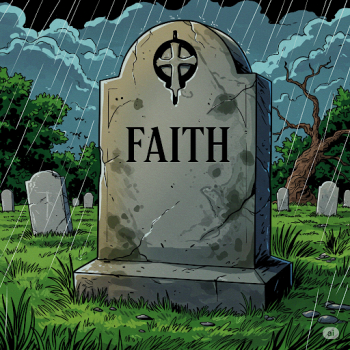One objection to Christianity in today’s internet atheism goes something like this: “There have been 3000 supposed gods throughout history. You don’t believe that they exist. But you do believe that your God exists. As atheists, we just take the natural next step. We believe that yours doesn’t exist either.”
Of course, there are a lot of ways to answer this argument, since, as an argument, it’s logically fallacious. For one, just because there are a lot of ways to be wrong doesn’t mean that there’s no way to be right. However, in this article, I want to show why it actually misunderstands the Christian beliefs about other gods.
Christianity is not naturalism plus God
What this argument assumes is that Christians hold the same basic worldview as naturalists. Christians agree that the natural world exists. They just add on one extra thing that they think exists as well: God. However, naturalists have a more sensible worldview because they don’t add that one extra thing.
But this is just not how Christianity works. It’s true that there are many Christians who are influenced by secularism so much so that they basically believe just that. But that isn’t the historically Christian position.
Instead, Christians believe that there are two realms, the natural and the supernatural. The supernatural realm undergirds the reality that we can see and touch. But that doesn’t make the supernatural less real.
Christianity teaches that there are multiple gods
In that supernatural realm are many different beings. The primary being, and the originator of everything, is the Creator God, who calls himself Yahweh. However, when he created the rest of what exists, he created both supernatural and natural beings, not just natural ones.
Typically, Christians talk today about supernatural beings in terms of angels and demons. But that’s not the only way the Bible talks about them. The Bible mentions many different gods, as well as beings called “rulers,” “powers,” “thrones,” and “dominions” (Eph 6:12, Col 1:16).
Some Christians believe that these other gods don’t actually exist. However, that’s not what the Bible seems to indicate.
So I believe that these 3000 gods are more or less all real. It’s just that only one of them was the source of all reality, and therefore only one of them deserves to be recognized as the Creator God. The others are wannabes who want to steal worship from the one God who truly deserves to be worshiped.
So you can see that the original objection to Christianity fails. Christianity doesn’t deny the existence of all these other gods. Christianity is entirely different from naturalism, not just naturalism plus God.
You could object, “Why be a supernaturalist when there’s no evidence for the supernatural?” But Christians believe that there is evidence for the supernatural—just not scientific evidence, since science is merely the study of the natural world, not the study of the supernatural world. But that’s an argument for another day.
For more information on early church teachings about angels and demons, I recommend this course.
Other religions have miracle claims, too
Another form of this atheistic argument goes like this: “People in all sorts of religions claim they experience miracles, but you don’t believe that their miracle claims prove their religion. So why do you believe in your miracle claims?”
Again, Christianity teaches that there will be many miracles and supernatural events outside of Christianity. After all, if there are lots of other supernatural “gods,” it would make sense that they would try to convince people to follow them by working miracles. However, Christianity offers us criteria for testing whether or not a miracle should convince us that the miracle-worker is trustworthy:
- Not all miracles are evidence that the miracle-workers are trustworthy (Matt 24:24). This makes sense if there are many different spiritual beings other than God.
- If someone makes a prophecy, and it doesn’t come true, they are not trustworthy (Deut 18:22). Again, this makes sense, because God knows the future, whereas these other beings might be mistaken about the future.
- All true prophets will be living virtuous lives (Matt 7:15-16). This makes sense, because God is able to empower us to do virtue, whereas other beings can’t help humans become truly virtuous.
- God chose the authentication of his message to be raising Jesus from the dead (Acts 17:31). This makes sense, because death is so ultimate and irreversible that only God can completely reverse it.
Other religions have religious texts, too
This argument also takes the form of pointing out that other religions have their own religious texts. But of course that’s not an objection—we would expect that to be the case. The question simply is, “Which religious text has the best evidence for its truth?” And the Bible is arguably the most consistent, historically accurate, and moral religious text out there.
Non-Christians also have religious experiences
Finally, people also point out that it’s not only Christians who have religious experiences. People from other religions do, too. In fact, it’s been pointed out that scientists know what areas of the brain light up whenever people have religious experiences—doesn’t this all mean that all religious experiences are fake?
Of course, that’s a bad argument as well. We would expect that, if there are multiple supernatural “gods,” that all these different gods would want to interact with their followers by giving them religious experiences.
Furthermore, as embodied creatures, of course our brains light up whenever we do things. That’s only to be expected. Our brains light up whenever we touch objects—does that mean that we aren’t really touching objects? In fact, scientists can actually stimulate the brain such that people are deceived into thinking that they are touching an object when they aren’t. Does that mean that no one ever touches an object? So even if scientists can stimulate the brain such that people are deceived into thinking that they are having a religious experience, that doesn’t mean that no one’s religious experiences are real.
Again, the question is whether the religious experiences should convince us to trust them. And again, we need to test them according to principles like the ones laid out in the Bible.
















